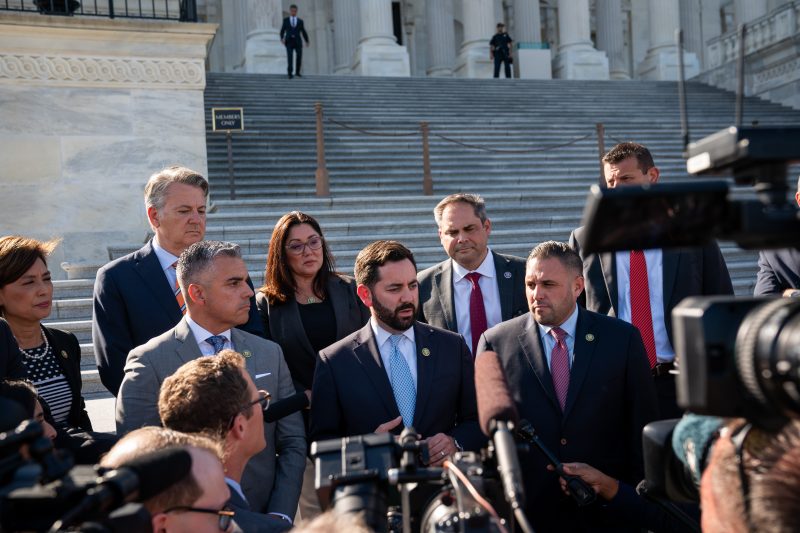New York’s Michael Lawler, one of the most vulnerable Republicans in Congress, held the gavel in the House chamber Friday when the colleagues he recently called “stuck on stupid” undermined yet another effort to prevent a government shutdown.
Lawler had been working hard in recent days to get ahead of his own party’s mess. He went on CNN to denounce its strategy, described the behavior of Florida Rep. Matt Gaetz as “absolutely disgusting,” and voted against an agricultural funding bill that would have barred dispensing abortion medication by mail.
But Democrats had been littering his moderate suburban district north of New York City anyway with direct mail and aired a television spot saying he had sided with extremists to undermine the middle class. All he could do was stand on the rostrum, with a flat voice, announcing the votes of another failure by his party to come together on any plan to do its job.
“Yes, it can be frustrating, and yes, government can be messy,” Lawler said later Friday. “I would have liked to have it go the other way. But we are where we are, so we just have to keep moving forward.”
Temporary relief for Lawler and his fellow swing-district moderates arrived Saturday, when Republican Speaker Kevin McCarthy heeded their call, shifted his approach and proposed a 45-day extension of government funding that Democrats could agree to, without the poison pills the holdouts had demanded.
The vote — along with expected approval in the Senate — prevents, for the moment, a shutdown so that both legislative bodies can pass the appropriations bills that will form the basis of further negotiation in November. It also opened the door to a likely effort to topple McCarthy from his own members.
Unlike prior threatened shutdowns, which came with semi-coherent policy goals, this one had arrived as an expression of pure dysfunction, with Republicans in the House unable to even agree on what they are seeking.
The decades-long drivers of deterioration in politics — the unfocused anger of the Republican base and a digital fundraising landscape that rewards gadflies — once again converged. In a closely divided Congress, a small minority of Republicans sought policy and political advantage at the expense of their colleagues, without any apparent path to substantive victory.
The same dynamics that threatened members like Lawler were likely to benefit the hard-liners he has denounced, including several leaders of the effort who are entertaining other jobs, for which federal obstruction could be an asset in a GOP primary.
Among the no votes Friday, a surprising number hope to leave Congress anyway. Gaetz is widely considered a likely candidate for governor in Florida. North Carolina’s Dan Bishop is running for attorney general. Montana’s Matthew M. Rosendale is edging toward a Senate campaign. Wesley Hunt is said to have statewide ambitions in Texas. Others come from polarized districts where the only election that counts is the primary, allowing a small, unrepresentative fraction of voters to decide. All could hold the line against their own party leadership and claim it as a feather in their cap.
“Republican primary voters will say, ‘At least he is fighting.’ And that sentiment is real,” said Doug Heye, a former Republican House leadership strategist, who has watched this trend for years. “They want to be seen as the ultimate fighter and you get the championship belt by the number of punches you throw, not the number you land.”
The result is a tale of degradation that was temporarily paused on Saturday. Government shutdowns since the 1990s have gradually devolved in quality from clashes over vetoed legislation to organized protests without hope of success to the current chaos. None has resulted in a clear policy success, and all have wasted money. A Senate report in 2019 found that the three shutdowns since 2013 had cost taxpayers $4 billion in idled employees, lost revenue and added expenses.
As tactics, they are public rejections of the system of compromise mandated by the separation of powers in the U.S. Constitution. Their fatal flaw ultimately lies in the underlying equation. When American leaders take aspects of their own country hostage, a grim reality emerges: Their only leverage is further self-harm.
The government stops slowly at first, then more dramatically. Parks close, air travel snarls, checks stop going out. Proponents inevitably fold, often while claiming an ineffable victory, as former president Trump did in 2019 when he caved after supporting a shutdown over border wall funding that won him nothing. To save face, he declared he would pay for the wall unilaterally, by claiming emergency powers, only to have his efforts eventually blocked by the courts.
“Any shutdown is a poorly conceived process. Just the fundamental thought that you want to promote a policy and put it into law, so you are going to shut the government until they agree with you — that just doesn’t happen,” said former House Minority Leader Eric Cantor of Virginia, who was part of leadership during a 16-day shutdown in 2013 over Obamacare. “The question is, ‘How long will it take until the pain becomes too much? And what is the fallout?’”
There is little evidence showing that shutdowns have a direct impact on the next congressional election. Republicans picked up seats after the 2019 and 2013 shutdowns, and maintained control of Congress after their adventure in 1995, albeit by diminished margins. But the indirect costs, especially in the short term, can be painful.
For days now, the conversation has shifted away from the alarmingly low polling of Democratic President Biden, the challenges at the border and the ongoing struggles of the economy. Democrats have won another talking point in their 2024 argument that the GOP is controlled by extremists who seek to undermine the American project. Many Democrats believe the 1995 shutdown helped Bill Clinton win reelection, and Republicans broadly blamed the 2013 shutdown for the loss of the governor’s race in Virginia given the enormous presence of furloughed government employees in that state. This is a bad omen for Republican Gov. Glenn Youngkin’s efforts to retake control of the legislature this fall.
“We are like those people in relationships that self-sabotage when everything is going great,” said one Republican campaign strategist who spoke on the condition of anonymity to speak frankly. “Because there are a group of nihilists in the House who do not want success. We have removed all the veils. And it is just naked performance and self-interest.”
The party’s House strategists hope that the American people will once again default to short-term memory when this is all over. Like the Hollywood writers strike, any shutdown ends at some point, allowing regularly scheduled programming to return.
“Americans care deeply about issues affecting their daily lives,” said Jack Pandol, a spokesman for the National Republican Congressional Committee, in a statement. “They know extreme Democrats destroyed their quality of life and refuse to clean up the mess.”
But not everything will be forgotten. With a four-vote margin, McCarthy, his smile undimmed, has been forced to abandon any ability to protect his vulnerable members from painful votes. Roll calls on massive spending cuts that will never happen and culture war assaults that can never pass the Senate have become routine, as the hard-liners have demanded a return to regular order. Democrats were delighted Thursday night when a half-dozen targeted members voted for the bill that contained a ban on mailing mifepristone, a medication that can trigger abortion.
“Speaker McCarthy is inconceivably hand-delivering Democrats the campaign ad-ready material proving just how extreme House Republicans have become,” said Viet Shelton, a spokesman for the Democratic Congressional Campaign Committee, in a statement.
Democrats also hold out hope that the bad blood inside the Republican caucus might lead to more retirements in the coming months, making it easier to take back control of the speakership next year.
“The challenge is this is not a budget fight. It is a fight for attention on some people’s part,” said Grover Norquist, the president of Americans for Tax Reform, who worked closely with Speaker Newt Gingrich during his shutdown fight with Clinton in 1995. “They want to be seen as if they are doing something as opposed to doing it. They want to be heard rather than to win.”
Bowing to reality, McCarthy has before cameras in recent days tried to claim that this brinkmanship had a higher purpose — to extract from Democrats more money and policy changes for the border. But the argument has been undercut by the statements of his own holdouts, and his inability to pass spending bills to even give the House a negotiating position with the Senate, where Republicans have little appetite for his posturing.
“Shutting down the government is a choice, and it is a choice that would make the crisis at the southern border even worse,” Senate Minority Leader Mitch McConnell (R-Ky.) declared this week.
Gaetz, who has delighted in the attention brought on by his obstinance, has also been gleefully undermining his own party’s message. “It’s Kevin McCarthy’s fault that the government is going to shut down,” he said Sept. 20.
Below the surface battle over funding levels and immigration, House Republicans are locked in myriad smaller disagreements, like the one over mifepristone, whether to defund parts of the Justice Department, whether to fund the Ukraine war, and whether government offices should be allowed to make the workplace welcoming for gay and lesbian employees.
Ultimately, these pressures proved too much for the speaker, prompting him to ask for Democratic votes Saturday in a last-ditch effort to keep the government open.
For his part, Lawler had been pushing McCarthy, whom he supports and praises, to abandon a Republican-only strategy and fund the government with Democratic votes, a path that could put his speakership, which its four-vote margin, in jeopardy. Lawler had also previously expressed a willingness to support a discharge petition, forcing a vote with Democrats even if McCarthy did not agree, if Republicans were not able to keep the government open on their own.
By Saturday afternoon, Lawler’s frustration had turned to something closer to triumph. He appeared in the House chamber again, this time speaking from the floor.
“All of us have a responsibility to lead and to govern. In a divided government none of us will get everything we want,” he said. “The time has come for everyone to put the American people above all interests and continue to do our work as responsible, reasonable and serious legislators.”
Marianna Sotomayor contributed to this report.



























